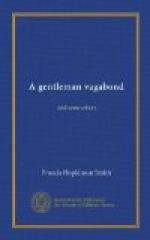“When the guard entered, she sent for her servant, and bade him watch out for a pot of coffee at the next station. ’To think monsieur had not slept all night!’ When Polaff handed in the tray, she filled the cups herself, adding the sugar, and insisting that I should also drink part of her own,—one cup was not enough. Upon Polaff’s return she sent for her dressing-case. She must make her toilet at once, and not disturb me. It would be several hours before we reached Vienna; she felt sure I would sleep now.
“I watched her as she spread a dainty towel over the seat in front, and began her preparations, laying out the powder-boxes, brushes, and comb, the bottles of perfume, and the little knickknacks that make up the fittings of a gentlewoman’s boudoir. It was almost with a show of enthusiasm that she picked up one of the bottles, and pointed out to me again the crest in relief upon its silver top, saying over and over again how glad she was to know that some of her own blood ran in my veins. She was sure now that I belonged to her mother’s people. When, at the next station, Polaff brought a basin of water, and I arose to leave the car, she begged me to remain,—the toilet was nothing; it would be over in a minute. Then she loosened her hair, letting it fall in rich masses about her shoulders, and bathed her face and hands, rearranging her veil, and adding a fresh bit of lace to her throat. I remember distinctly how profound an impression this strange scene made upon my mind, so different from any former experience of my life,—its freedom from conventionality, the lack of all false modesty, the absolute absence of any touch of coquetry or conscious allurement.
“When it was all over, her beauty being all the more pronounced now that the tired, nervous look had gone out of her face, she still talked on, saying how much better and fresher she felt, and how much more rested than the night before. Suddenly her face saddened, and for many minutes she kept silence, gazing dreamily down into the abysses white with the rush of Alpine torrents, or hidden in the early morning fog. Then, finding I would not sleep, and with an expression as if she had finally resolved upon some definite action, and with a face in which every line showed the sincerest confidence and trust,—as unexpected as it was incomprehensible to me,—she said:—
“’Last night you asked me for my name. I would not tell you then. Now you shall know. I am the Countess de Rescka Smolenski. I live in Cracow. My husband died in Venice four days ago. I took him there because he was ill,—so ill that he was carried in Polaff’s arms from the gondola to his bed. The Russian government permitted me to take him to Italy to die. One Pole the less is of very little consequence. A week ago this permit was revoked, and we were ordered to report at Cracow without delay. Why, I do not know, except perhaps to add another cruelty to the long list of wrongs the government have heaped upon my family. My husband lingered three days with the order spread out on the table beside him. The fourth day they laid him in Campo Santo. That night my maid fell ill. Yesterday morning a second peremptory order was handed me. I am now on my way home to obey.’




